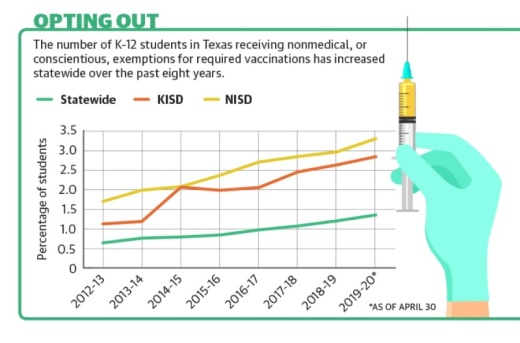During the 2019-20 school year, some 3.3% of NISD students received exemptions from state vaccination requirements for reasons of conscience, according to the Texas Department of State Health Services. Those same type of students totaled 2.84% of all KISD students during the same time period.
 “Keller ISD has seen a slight uptick by about 0.2% per year in conscientious immunization exemptions [since 2017],” said Tricia Atzger-John, KISD director of health services. “Per State requirements, Keller ISD must be provided with an immunization record for each child enrolled in the district. If a parent chooses to not vaccinate their child, a waiver must be filed through the state of Texas.”
“Keller ISD has seen a slight uptick by about 0.2% per year in conscientious immunization exemptions [since 2017],” said Tricia Atzger-John, KISD director of health services. “Per State requirements, Keller ISD must be provided with an immunization record for each child enrolled in the district. If a parent chooses to not vaccinate their child, a waiver must be filed through the state of Texas.”A conscientious exemption can be granted when a parent objects to the state’s vaccination requirements based on personal beliefs, religious or otherwise. As such, a parent or guardian has the legal right to exclude their children from otherwise required immunizations.
According to DSHS officials, while vaccinated students greatly outnumber those who are not vaccinated, the risk for an outbreak remains, and the risk is higher when more than 5% of students are unvaccinated, officials said.
“You want to build as much protection into the community as you possibly can to protect everybody,” said Chris Van Deusen, director of media relations for the DSHS. “If it’s one [unvaccinated] person and everybody else is immunized, it’s not going to be [a problem], but when you see immunization rates falling under 95%, you start to get concerned.”
Across the state, in 2019-20, the number of K-12 students receiving nonmedical, or conscientious, exemptions for required vaccinations increased for the 10th straight year, according to data from the Texas Education Agency.
Numbers from the TEA’s annual survey gauging immunization status reflect responses from roughly 1,200 districts and 900 accredited private schools in Texas.
The most recent survey available as of April 30,indicates that 1.35% of K-12 students in the state received conscientious exemptions during the 2019-20 school year, an increase from an average of 1.20% in 2018-19.
“The state provides the parent with a specific document that must be signed and notarized before [it’s] provided to the school nurse. These waivers must be resubmitted every two years,” Atzger-John said. “We have some students who are unable to receive vaccines for other health reasons. These exemptions may be short-term [and] renewed annually by the child's physician or lifelong.”





